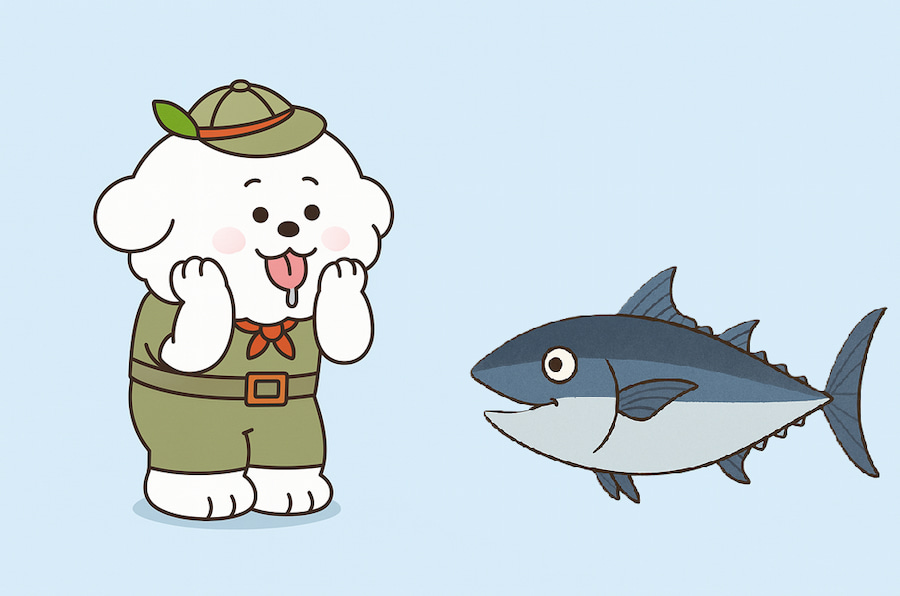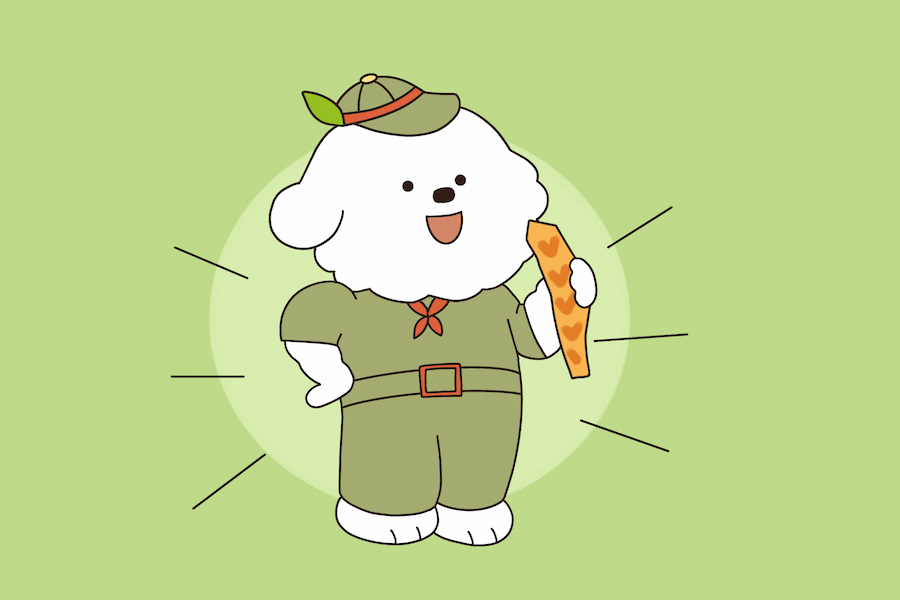Can dogs eat cherries? The simple answer is: Yes, dogs can eat cherries. However, it would be best if you take some precautions while feeding cherries to your dog.
Let’s discuss this in detail: Can dogs eat cherries? Are cherries good for dogs? What health benefits does it offer your fur buddy? How much cherries can a dog eat? By exploring these questions, we can better understand the role of cherries in a dog’s diet. Let’s find out.

Lee&Pol is continuously researching treat recipes for dog’s health by combining cherries with dried pollock, thoroughly removing salt and bones over 24 hours!
Can Dogs Eat Cherries?
Yes, dogs can eat cherries, but you need to be careful! Cherries are a rich source of vitamins and minerals and contain antioxidant properties. However, there are some risks associated with feeding cherries to your dog.

You can not feed a whole cherry to your fur buddy because some of its parts contain a harmful substance called cyanide.
Are Cherries Good for Dogs?
Cherries are like a double-edged sword, with both pros and cons. However, if you pay attention to the precautions, cherries can provide various health benefits to your dog.
Though cherries are nutritious as they contain vitamins and minerals such as vitamin C, an antioxidant, they also have a harmful substance known as cyanide. So, you must consider these benefits and disadvantages when feeding your fur buddy cherries. Let’s look at them in detail one by one.
Benefits Of Cherries for Dogs
Cherries are rich in minerals and vitamins, which boost your dog’s immune status. The fruit is also a rich source of vitamin C, an antioxidant.
The tendons and joints of your dog stay in good health due to the antioxidants that cherries have. Moreover, you can offer your fur buddy cherries if you run out of their usual snack stock at home.
The following are the benefits of each nutrient present in cherries:
- The vitamin A present in cherries helps to improve your dog’s vision.
- Cherries are rich in vitamin C. It has antioxidant properties that can help your dog get rid of free radicals that are harmful to their health, support healthy aging, and reduce inflammation.
- Anthocyanins, a potent antioxidant found in cherries, benefit brain function.
- Fiber present in the cherries is essential for gut health.

Lee&Pol offers the best treats for your dog’s health by combining cherries with dried pollock, rich in calcium, omega-3 fatty acid, and protein!
How To Feed Cherries To Dogs
If you choose to feed your dog cherries, you must remove the stems altogether. Do not feed your dog dried or canned cherries as they contain preservatives and additional sugar content, which is harmful to your pet if you feed him regularly.
When introducing new foods into their diet, start gradually with small quantities to ensure their body does not react adversely. Then, you can increase the quantities if your dog digests them well.
Precautions to Consider when Feeding Cherries to Your Dog
It is important to keep in mind certain risk factors while feeding cherries to your fur baby. Here are some precautionary measures that need special attention:
- Avoid feeding the harmful parts of the cherry to your lovely dog. For instance, pits, leaves and stems are not made for dogs. Moreover, the chances of choking are there with pits of cherries. Furthermore, we can’t overlook the life-threatening compounds e.g. cyanide that are present in pits and leaves.
- Make sure to control the portion as feeding large amounts of cherries may put your dog in trouble. Likewise, overfeeding of cherries results in digestive disturbance.
- Never make the mistake of bring home canned cherries. The reason is the presence of unnecessary and harmful ingredients like sugar and additives that are harmful for your buddy.
- Keep a close eye on your dog in case of eat a cherry pit accidentally. Look for adverse signs of cyanide poisoning and intestinal blockage carefully.
Symptoms of Cyanide Poisoning & Intestinal Blockage
Symptoms of cyanide poisoning:
- Dilated pupils
- Bright red gums
- Labored breathing
Symptoms of intestinal blockage
- Vomiting
- Decreased appetite
- Constipation

Lee&Pol makes a safe and healthy treat for your dog by completely removing the seeds, stems, and leaves from cherries, and freeze-drying only the fruit!
How Many Cherries Can a Dog Eat?
It depends on your dog’s tolerance levels, weight, and size.
- Small dogs (under 22 lbs): 1~2
- Medium dogs (between 22-55 lbs): 3~4
- Large dogs (over 55 lbs): 5 or more depending on size
Downsides Of Dogs Eating Cherries
Cherries have a lot of sugar content, which harms your pet. Frequently feeding cherries to your dog can lead to weight gain due to high sugar.
Taking excessive amounts of cherries can cause digestive upset in your dog. Your fur buddy may experience vomiting and diarrhea due to stomach disturbance.
Here is a list of issues your dog may face due to excessive feeding of cherries.
1. Potentially Unsafe Pits and Stems of cherries
Pits and stems of certain fruits are dangerous for your dog, and unfortunately, cherry is one of them. Therefore, don’t forget to remove pits and stems of cherries before offering.
Cyanide Poisoning
The pit of a cherry contains a compound named amygdalin. After chewing and crushing these pits by your dog, the conversion of amygdalin to cyanide happens in the body. Resultantly, the symptoms of cyanide poisoning occur. However, keep in mind that one pit alone can’t be a culprit.

If your dog has taken a large number of whole cherries along with their pits and stems, you should rush to the veterinarian even if your furry fellow is asymptomatic.
2. Risk of choking
Eating cherries with pits brings about two major hazards to your dog. One of them is choking while the other one is bowel obstruction. Moreover, there might be a need for surgical intervention if the condition gets worse. Besides that, chances of toxicity are also there for your dog.
3. Exposure To Alcohol from Rotting Cherries
There have been incidents of rotting cherries fermenting into alcohol. This obviously can be dangerous for dogs. This can cause alcohol poisoning in dogs, which may manifest as:
- Vomiting
- Whining
- Depression
- Disorientation
- Difficulty getting up
- Dehydration
- Pink mucous membranes
- Slow respiratory rate
- Low body temperature
4. Dental damage
The pit is like a hard, small stone, and when your dog bites on it, the stone may cause a tooth fracture.
Signs of dental damage include:
- Discomfort when teeth are touched or tapped
- Teeth that appear reddish-brown, purple, or Gray
- A visible fracture on a tooth
- A red or black hole on a crown
- Facial swelling
- Appetite loss
5. Sugar Intake
Remember that a single cup of raw cherries, about 20 without pits, contains roughly 20 grams of sugar. This amount of sugar can be pretty high for dogs.
These excessive sugar amounts can lead to obesity and, hence, joint problems such as patella luxation in your dog. Dogs that are obese experience arthritis and joint issues early in their life than others.

Obese dogs are more prone to complications like diabetes, heart, kidney, and liver diseases.
Conclusion
Cherries are harmful and beneficial for your dog, depending on how you provide them to your dogs. If given in moderate amounts and without seeds, they are a valuable source of nutrition. They provide vitamins and helpful nutrients that contribute to your dog’s health.
If served in large quantities, they can cause obesity and other health issues. Moreover, you must remove seeds while offering your pet cherries as they contain cyanide, which is toxic. Always consult your vet when providing something for your pet to feed.
FAQ
No, cherry seeds have a highly toxic substance called cyanide, so you should not allow your dog to eat cherry seeds.
Cherries are partly suitable for dogs if they are offered without the seeds. They are good as they have some nutritious vitamins and minerals in them. They are loaded with large amounts of vitamin C and other antioxidants. They also contain Vitamin A, melatonin and fibre, which are essential for your dog’s overall wellbeing.
Cherries should be fed in moderate amounts without seeds and stems. These parts of cherries are harmful due to the presence of cyanide.
Start with a few cherries and observe if your dog likes them and does not show any adverse effects from eating them.
The safe amount of cherries that your dog can eat depends on certain factors like size, weight, and overall wellness.
In general, based on their size is 1-2 cherries for small dogs, 3-4 cherries for medium dogs, and 5 or more cherries for large dogs, depending on their size.



